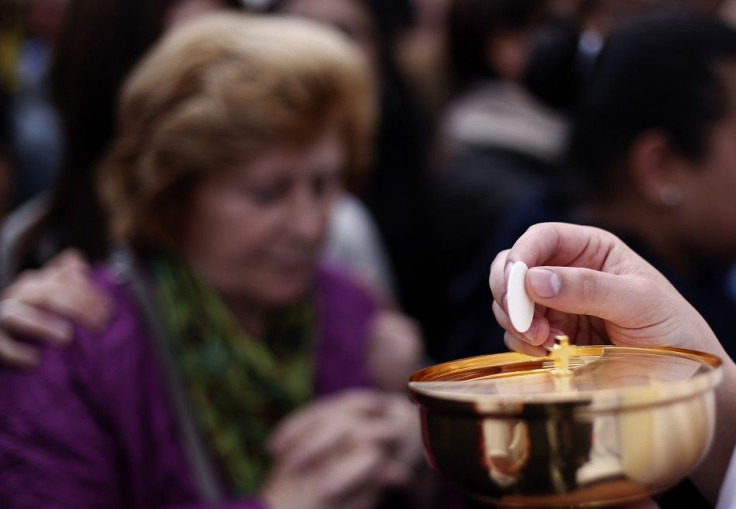Pope Francis Mulls Lifting Holy Communion Ban on Divorcees, Feared to Split Catholic Church

Drumbeating for Pope Francis' first synod or meeting of bishops on Oct 1 is already getting controversial. Reports point that Benedict XVI's successor is mulling to lift the ban on Holy Communion to Roman Catholic divorcees, a move likely to face stern consternation from some of the international bishops who have a conservative outlook on the matter.
While Pope Francis' reformist stance had endeared him to many of the 1.3 billion strong Catholics, such as choosing a silver ring rather than a gold one, or preferring a much humble abode rather than the palatial suite previous popes have lived in, changing some rules, however, could be create further controversy than other changes made by the pontiff. Some Catholic bishops would likely be closed to a discussion for the lifting of the ban.
Earlier, the Argentinian pontiff created a panel of theologians and canon lawyers who's tasked to simplify the process of getting annulments from the Roman Catholic Church.
However, lay people could find the proposed changes more acceptable.
Tina Beattie, a professor of Catholic Studies at Roehampton University, London, said Pope Francis has started the wheels turning, and said she won't be surprised if the topics of divorce, annulments and the prevailing ban of giving holy communion will be heavily discussed in Rome on Sunday.
"The ground has been well-prepared for a shift on the readmission of divorced and remarried Catholics to the sacraments," she told the Guardian. "I don't think this will involve any change in doctrine. It will be a pragmatic shift which will put pastoral practice before doctrinal rigidity."
A listing at portal romancatholicism.co.uk said those Roman Catholics considered ineligible to receive holy communion include:
- People who live together in a state of fornication - whether gay or straight;
- People who divorce their spouses and remarry other people;
- Catholics who married outside the Church or in a same-sex marriage;
- Heretics who are not ashamed to let the world know what they are;
- Abortionists;
- Pro-choice politicians and activists;
- LGBT activists;
- Priests who left the ministry without permission;
- Protestants.
Portal catholic.com, citing The Cathechism, explained, as in the case of divorcees, "a new union cannot be recognized as valid, if the first marriage was. If the divorced are remarried civilly, they find themselves in a situation that objectively contravenes God's law."
Cardinal George Pell, a former archbishop of Sydney and now prefect of the Vatican's Secretariat for the Economy, said the faith ought to reinstatement a clearer set of rules regarding the matter.
"The sooner the wounded, the lukewarm, and the outsiders realize that substantial doctrinal and pastoral changes are impossible, the more the hostile disappointment (which must follow the reassertion of doctrine) will be anticipated and dissipated," the Catholic Herald quoted Pell earlier.
Pope Francis, dubbed as a radical and modern pontiff, has constantly emphasised the Church's desire to be more compassionate and open, as such breaking down many of the Church's archaic traditions. He is the first Latin-American and non-European pope.





















